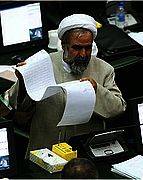Crisis in Security-Military Apparatus
» Majlis to Stop the Retirement of Intelligence Officers
Following the differences between the security and military agencies in Iran, and also the departure of the personnel of these organization since the beginning of protests in 2009 to the disputed presidential elections, Majlis deputies passed a resolution to stop the retirement of intelligence officers while Revolutionary Guard commanders recently publicly called the retirement of military-security personnel a “crisis” and a “potential threat” to the security of the Islamic regime.
Fars news agency, affiliated with Iran’s military-security agencies reported on Tuesday that 129 Majlis representative voted for the immediate deliberation of a bill to amend article 57 of the employment regulations of the ministry of intelligence.
According to this article, the personnel of the ministry will be retired upon serving for thirty years at the ministry or reaching the age of sixty.
Speaking on this subject, Ruhollah Hosseinian, a Majlis deputy who has also served in the country’s security agencies and is currently a representative of the Revolutionary court system, said, “At the moment, some of those who work at the ministry of intelligence reached the retirement age last year and based on article 57 of the employment regulations of the ministry of the interior they must be retired and relieved of their service. But this would result in the departure of personnel that constitute the core of the intelligence ministry, thus depriving the agency of experienced hands so that new recruits will not be able to benefit from the experience of the former employees.”
“These personnel have seen the conspiracies and crises of the country and have thus gained experience in dealing with these conditions, and so must not be allowed to leave the ministry of intelligence,” he said. The proposed bill would allow the ministry to keep its old hands.
It should be noted that following the protests that engulfed Iran after the disputed 2009 presidential elections, differences developed between the ministry of Intelligence, the Revolutionary Guards and the administration of Mahmoud Ahmadinejad on how to deal with the protests and the protestors, including the arrest and prosecution of the political personalities. This resulted in the departure of personnel from the ministry.
In addition, following the dismissal of Gholam-Hossein Mohseni Ejei as the minister of intelligence by Ahmadinejad who himself became the care taker of the agency, many long-standing individuals left the ministry while he himself dismissed some of the senior officials of the ministry, creating an expertise gap among security experts.
On August 4 last year, Alaedin Borujerdi, the head of the Majlis national security and foreign policy committee revealed that “the special assistant of the ministry and the deputy of counter intelligence of the ministry of intelligence was fired by Ahmadinejad after two decades of service in the field. The firings also resulted in a warning by a former intelligence minister Ghorbanali Dori Najafabadi. In an open public letter, he stressed that because of the role of the senior intelligence officials, the need of the country for their expertise needed to be looked in a larger national context.


